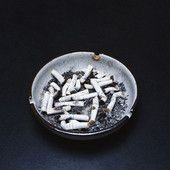Secondhand Smoke Increases Childhood Hospitalization Risk
Childhood exposure to secondhand tobacco smoke, particularly during the first 6 months of life, increases the risk of being hospitalized for infectious illness, according to research published online May 27 in Tobacco Control.

THURSDAY, May 29 (HealthDay News) -- Childhood exposure to secondhand tobacco smoke, particularly during the first 6 months of life, increases the risk of being hospitalized for infectious illness, according to research published online May 27 in Tobacco Control.
Man-Ki Kwok, from the University of Hong Kong in China, and colleagues examined the risk of first admission to public hospitals based on exposure to secondhand smoke up to 8 years of age in 7,402 children born in 1997 in Hong Kong.
After adjustment for a number of factors, the researchers found that household exposure to secondhand smoke within 3 meters increased the risk of hospital admission for infectious disease (hazard ratio, 1.14). The risk was highest with exposure during the first 6 months of life (HR, 1.45). In more vulnerable groups, such as preterm babies, the increased risk persisted up to 8 years of age (HR, 2.00), the report indicates.
"Household secondhand smoke exposure in early infancy increases severe infectious morbidity requiring hospital admission," Kwok and colleagues conclude. "Low birth weight and premature infants may be more vulnerable than other infants to secondhand smoke exposure with longer lasting effects up until 8 years of age."
AbstractFull Text (subscription or payment may be required)
Copyright © 2008 ScoutNews, LLC. All rights reserved.